- Home
- Joel C. Rosenberg
The First Hostage: A J. B. Collins Novel Page 2
The First Hostage: A J. B. Collins Novel Read online
Page 2
There was a long pause.
“What do you mean, missing?” said the crackling, garbled voice on the other end of the line, on the other side of the world.
Allen MacDonald had worked at the New York Times for the better part of forty years. He’d been the foreign editor since I was in high school. For as long as I had been with the Times—which was now well over a decade—we’d worked together on all kinds of stories, from assassinations to terror attacks to full-blown wars. I was sure he had heard it all in this business . . . until now.
“I mean missing, Allen. Gone. Lost. No one knows where he is, and all hell is breaking loose here,” I said as I looked out over the devastation.
Amman’s gorgeous new international airport was ablaze. Thick, black smoke darkened the midday sun. Bodies were everywhere. Soldiers. Policemen. Ground crew. And an untold number of jihadists in their signature black hoods, their cold, stiff hands still gripping Russian-made AK-47s. Anyone not already dead, myself included, was wearing a protective chem-bio suit, breathing through a gas mask, and praying the worst of the sarin gas attacks were over.
“But I–I don’t understand,” Allen stammered. “CNN is reporting Air Force One is safe. That it’s already cleared Jordanian airspace. That it has a fighter escort.”
“It’s all true,” I replied. “But the president isn’t on it.”
“You’re sure?”
“Absolutely.”
“There’s no chance that you misheard.”
“No.”
“Misunderstood?”
“No.”
“Fog of war?” he pressed.
“Forget it.”
“Maybe somebody said it as a tactical diversion, to throw off ISIS or other enemies.”
“No, Allen, listen to me—the president is not on that plane. I’m telling you he’s missing, and people need to know.”
“Collins, if I go with this story and you’re wrong . . .”
Allen didn’t finish the sentence. But he didn’t have to. I understood the consequences.
“I’m not wrong, Allen,” I said. “This is solid.”
There was another pause. Then he said, “Do you realize what this means?”
“No,” I shot back. “I don’t know what this means. And neither do you. I don’t even know for sure if he’s been captured or injured or . . .” Now my voice trailed off.
“Or killed?” Allen asked.
“I’m not saying that.”
“What, then? Missing and presumed dead?”
“No, no—listen to me. I’m giving you precisely what I know. Nothing more. Nothing less.”
“So where do you think he is?”
“I have no idea, Allen. No one does. But my sources were explicit. Air Force One took off without the president.”
“Okay, wait,” Allen said. “I’m putting you on speaker. I’m going to record you. And Janie is here. She’s going to type up everything you tell us.”
I could hear some commotion as he set up a digital recorder, cleared space on his desk, and shouted for Mary Jane, his executive assistant, to bring her laptop into his office immediately. A moment later they were ready.
I took a deep breath, did my best to wipe some of the soot from my gas mask, and checked my grandfather’s pocket watch. It was now 3:19 p.m. local time on Sunday, December 5.
“Okay, take this down,” I began. “The president of the United States is missing. Stop. Air Force One took off from the Amman airport under a U.S. fighter jet escort shortly after 2:30 p.m. Stop. But President Harrison Taylor was not on the plane. Stop. U.S. and Jordanian security forces are presently engaged in a massive search-and-rescue effort in Jordan to find the president. Stop. But at the moment the president’s whereabouts and safety are unknown. Stop.”
My hands were trembling. My throat was dry. And my left arm was killing me. I’d been shot—grazed, really—above the elbow in a firefight back at the Al-Hummar Palace during the ISIS attack. It had been bleeding something fierce until Yael Katzir, the beautiful and mysterious Mossad agent who had assisted me in getting King Abdullah and his family to safety, had tied a tourniquet on it. That was just after we arrived at the airport, just before she boarded the chopper that was taking Prime Minister Daniel Lavi back to Israel for emergency medical treatment. I was going to need something for the pain, and soon, but I knew Allen required more details, so I kept going.
“The devastating chain of events began unfolding early Sunday afternoon in the northeast suburbs of Amman. Stop. Forces of the Islamic State launched a multiprong terrorist attack on the Israeli–Palestinian peace summit being held at Al-Hummar Palace. Stop. Just before the ceremony to sign a comprehensive peace treaty began, a Jordanian F-16 flying a combat air patrol fired an air-to-ground missile at the crowds gathered for the summit. Stop. The pilot of the F-16 then flew a suicide mission into the palace. Stop. Simultaneously, thousands of heavily armed Islamic State terrorists penetrated the grounds of the palace. Stop. Under heavy fire, security forces evacuated President Taylor, Jordan’s King Abdullah II, Israeli prime minister Daniel Lavi, and Palestinian president Salim Mansour from the palace grounds. Stop. Lavi and Mansour were severely wounded and are being airlifted to Jerusalem and Ramallah, respectively. Stop. Witnesses saw a black, bulletproof Chevy Suburban driven by U.S. Secret Service agents whisking President Taylor away from the scene of the attacks. Stop. But that vehicle never reached the airport. Stop. Sources tell the Times the president learned the airport was under attack by ISIS terrorists and called the commander of Air Force One and ordered him to take off immediately to protect the plane and crew. Stop. The president reportedly told the pilots he would recall them once Jordanian military forces regained control of the airport grounds. Stop. However, at this moment, senior U.S. government officials say they do not know where the president is, nor can they confirm his safety. Stop. Neither the president nor his Secret Service detail is responding to calls. Stop.”
I paused, in part to allow Janie to get it all down, but she was a pro and had had no trouble keeping pace.
“I’m with you,” she said. “Keep going.”
“I think that’s it for now,” I said. “We need to get that out there. I can call back and dictate more details of the attack in a few minutes.”
“That’s fine, but who are your sources, J. B.?” Allen asked.
“I can’t say.”
“J. B., you have to.”
“Allen, I can’t—not on an open line.”
“J. B., this isn’t a request. It’s an order.”
“I have to protect my sources. You know that.”
“Obviously. I’m not saying we’re going to include them in the story, but I have to know that the sources are solid and so is the story.”
“Allen, come on; you’re wasting time. You need to get this out immediately.”
“J. B., listen to me.”
“No, Allen, I—”
“James!” he suddenly shouted. I’d never heard him do it before. “I can’t just go on your word. Not on this. The stakes are too high. A story like this puts lives in danger. And getting it wrong is only half the issue. I’m not saying you’re wrong. I can hear in your voice that you believe it’s true. And I’m inclined to believe you. But I have to answer to New York. And they’re going to have the White House and Pentagon and Secret Service going crazy if we publish this story. So tell me what you know, or the story doesn’t run.”
2
Allen was right, of course.
The stakes couldn’t be higher. But still I hesitated. I couldn’t tell him how I knew. I could only tell him what I knew and that the story—however horrible, whatever the repercussions—was solid.
The monarch of the Hashemite Kingdom of Jordan—King Abdullah II himself—had just hung up from a secure call with the Pentagon. He’d spoken with the chairman of the Joint Chiefs of Staff. And he’d just relayed to me the essential details of the conversation. Did that count as one source or two?
I realized it could be argued that it was only one. After all, I hadn’t spoken with the chairman myself. But under the circumstances I was counting the intel as reliable. The king had told me nearly verbatim what the man had said. There was no reason for him to lie to me. I could see in his eyes he was telling me the truth, especially after all we had just been through. And what he told me rang true with everything that was playing out around me. I could see for myself that Air Force One was gone. I could see that the Chevy Suburban that had carried the president from the palace was not here on the airport grounds and was nowhere to be found. I had heard with my own ears when the king called his brother, Prince Feisal, the deputy supreme commander of the Jordanian armed forces, and ordered a massive search of Route 35, the Queen Alia Highway, the very road we’d just taken to the airport and the last known location of the president.
I knew the facts. But I also knew I couldn’t directly betray the king’s confidence. I couldn’t run the risk that if I told Allen these details, some of them might wind up in the final story. I trusted Allen, but I wasn’t sure I trusted his bosses in New York. What’s more, I couldn’t chance any errors. Allen had mentioned the fog of war, and I’d experienced the phenomenon myself countless times before. I knew mistakes could happen. I’d made my share over the years. I didn’t intend to make one now.
I looked out on the burning wreckage of two jumbo jets as His Majesty strode across the tarmac. He was about to board a Black Hawk helicopter that had just landed and was kicking up a huge cloud of dust. Before stepping aboard, the king turned and frantically waved me over. He wasn’t going to wait for me. If I was going to stay with this story, I had to go and go now.
It was suddenly clear to me that I was about to make a career-altering decision. The king hadn’t specifically authorized me to tell the world what he’d just told me. But he hadn’t expressly forbidden it either. He knew full well I was a foreign correspondent for the New York Times. He had to know I was going to call the information back to Washington. He could hardly expect me to keep this a secret. Still, it was a judgment call. He might have just been telling me as a friend, as someone who had saved his life. Maybe at that moment he didn’t see me as a journalist but as an ally. Or maybe he wasn’t thinking clearly.
I didn’t want to burn a source. I certainly couldn’t burn a king. But in my mind there simply was no choice. Americans had to know their commander in chief was missing. After all, weren’t there serious national security implications at play here? Weren’t there grave constitutional implications as well? Was Harrison Taylor still technically the president? Or in his absence had power shifted to the vice president, even temporarily? For that matter, where was the VP at the moment? Was he safe? Had he been briefed? Was he ready for what was coming? Was anyone in Washington ready for this? Then again, what was “this” exactly?
I had no idea. We were in uncharted waters. All I knew for certain at that moment was that the American people needed to know what I knew. They needed to know the facts. They needed to be asking the same questions I was asking. And people at the highest levels of the American government needed to be providing answers.
It was true, of course, that informing the American people that the leader of the free world was missing meant simultaneously informing the enemy. What would ISIS do with such information? Would it give them a tactical advantage in the current crisis? It would almost certainly give them a propaganda victory of enormous proportions unless the president resurfaced quickly, safely, and in full command. But none of that was my concern. My job was to report what I was seeing and hearing, regardless of the consequences to me or anyone else. I just had to make sure I didn’t expose my sources.
Running now for the waiting chopper and fearing His Majesty might lift off without me, I shouted into the phone. “Allen, I’m sorry. I hear what you’re saying, but I can’t do it. Are you going to run the story or not?”
There was a long pause. For a moment I thought I’d lost the connection, but as I approached the Black Hawk, I could see that—incredibly—I still had four out of five bars of service and an open line to Washington.
“Are you going to run the story or not?” I shouted again over the roar of the rotors.
Allen’s answer knocked the wind out of me.
“No, J. B., I’m not,” he shouted back. “Not until you give me your sources. I’m not a federal grand jury. I’m your editor, and I have a right to know.”
3
Hanging up, I jumped into the waiting chopper.
A soldier slammed the door behind me, and seconds later we were off the ground. To my astonishment, King Abdullah was at the controls. He still had his chem-bio suit on, as did we all, but he had taken full command of the situation. We shot hard and fast over the desert floor, then gained some altitude and banked east.
“Where are we going?” I asked the Royal Jordanian Air Force captain who had clearly been asked to relinquish the controls and was now sitting beside me, along with a half-dozen heavily armed special forces operators scanning both the skies and the ground for trouble.
“I can’t say,” the captain replied.
“Classified?” I asked.
“No,” he said into my ear. “I just have no idea.”
The king—a highly experienced helicopter pilot, not to mention the supreme commander of Jordan’s military—was keeping his cards close to his vest, and given the circumstances, he was probably right to do so. He was in the midst of a coup d’état. Much of his government had just been killed by forces loyal to the Islamic State. His palace, his friends, and the region’s hopes for peace had been destroyed by a traitorous member of his own air force. He clearly wasn’t taking any chances with who was going to fly his chopper, and he was certainly not going to confide his immediate plans to anyone he didn’t implicitly trust, which at the moment had to be almost no one.
Wincing in pain and feeling blood trickling down my left arm, I buckled up and looked out at the billows of smoke rising over Amman. Wherever we were going, I could only hope I could get some medical care when we arrived. I hadn’t had time to examine the wound, and Yael hadn’t had time to clean it, much less dress it. She’d simply taken the queen’s scarf and tied it tightly around the wound before helping the queen and the crown prince into their chopper, bound for some secure, undisclosed location.
I closed my eyes for a moment and tried not to think of the excruciating burning sensation shooting up and down my arm. Instead I tried to turn my thoughts to Yael. Was she okay? She’d been twice punched hard in the face during a struggle with one of the hooded jihadists that had stormed the palace grounds—a struggle that had nearly taken both our lives. She’d also sustained a terrible gash to her forehead while we were escaping from the compound in the king’s Suburban. But she’d never complained for a moment. She’d done everything she could to save the lives of her own prime minister and of the Palestinian president, even while protecting the royal family and me. Was she safe now? Were she and her team already on the ground in Jerusalem? Was Prime Minster Lavi going to make it? Was President Mansour?
Opening my eyes, I turned to the window and winced at my reflection. Aside from the cuts and scrapes and bruises on my cheeks and forehead—not to mention across my entire body—the face of an increasingly weathered and tired old man was staring back at me. I was barely into my forties, but a line from a Harrison Ford film echoed in my brain. “It’s not the years, honey; it’s the mileage.” That was exactly how I felt. I was a foreign correspondent, a war correspondent, part of “the tribe” of reporters who cheated death and covered the news from the front lines of the most terrifying events on the planet. But death was catching up fast. I was an adrenaline junkie who had always loved jetting around the globe, living out of a suitcase, pushing the envelope in every area of life. But now I was also divorced, a recovering alcoholic, exhausted, and alone. My friends were dead or dying. My family was half a world away, and I barely saw them. I hadn’t had a date in years. And n
o matter how hip and expensive my black, semi-rimless designer glasses were, they couldn’t hide my bloodshot eyes. No matter how many years ago I’d shaved my increasingly gray head bald, I was still sporting a salt-and-pepper mustache and goatee. They no longer looked cool, I decided. They just made me look like a guy trying too hard to hold on to his youth.
Unable to take any more of myself, I shifted focus and tried to make sense of the surreal scene out my window. From our vantage point, south-southeast of the capital, I could see squadrons of F-15s and F-16s streaking across the skies of Amman, dropping their ordnance on the ISIS forces below. I watched the spectacular explosions that ensued and could even feel the impact ripple through my body. I quickly snapped some photos on my iPhone and then took a shot of the king flying the Black Hawk before anyone could tell me not to.
My thoughts shifted back to the president. Where was he? Were he and his security detail under fire? Were they in immediate and overwhelming danger? Or was the Secret Service just lying low, keeping their charge out of sight and off the air until they had more confidence they could truly get him to safety?
Allen’s refusal to run my story stunned me. The more I thought about it, the angrier I became. After all these years, after who knew how many stories—many of them exclusives—how could he not trust me now? Did he really think I would run with such a provocative story as the president of the United States being missing in the middle of a coup attempt unless I was absolutely certain? I didn’t mind if he added caveats to the story, hedged the language a bit to make it clear this was a fast-developing story and the situation could change at any moment. To the contrary, that was undoubtedly the right thing to do. But he knew I was in the eye of the storm. He knew I was with the highest-ranking leaders in Jordan who were still breathing and fully conscious. Where did he think I was getting this information?

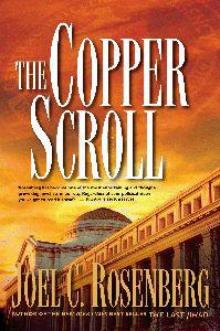 The Copper Scroll
The Copper Scroll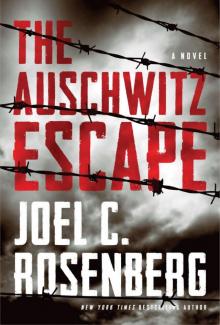 The Auschwitz Escape
The Auschwitz Escape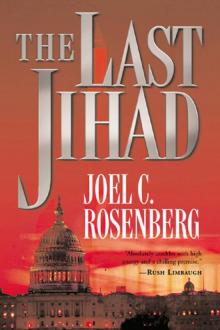 The Last Jihad
The Last Jihad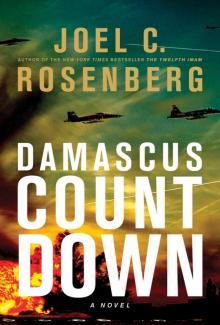 Damascus Countdown
Damascus Countdown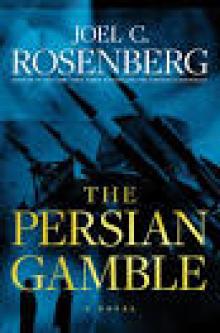 The Persian Gamble
The Persian Gamble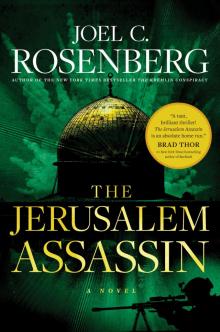 The Jerusalem Assassin
The Jerusalem Assassin Dead Heat
Dead Heat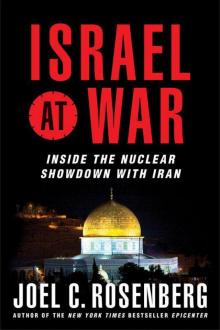 Israel at War: Inside the Nuclear Showdown With Iran
Israel at War: Inside the Nuclear Showdown With Iran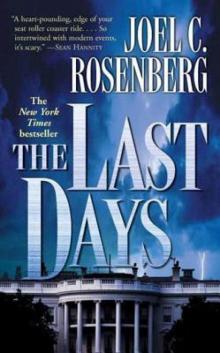 The Last Days
The Last Days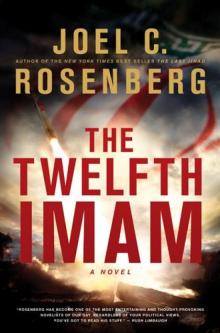 The Twelfth Imam
The Twelfth Imam Epicenter 2.0
Epicenter 2.0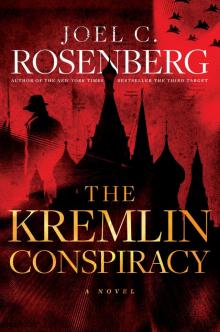 The Kremlin Conspiracy
The Kremlin Conspiracy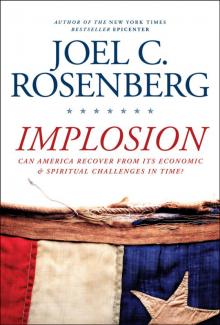 Implosion: Can America Recover From Its Economic and Spiritual Challenges in Time?
Implosion: Can America Recover From Its Economic and Spiritual Challenges in Time?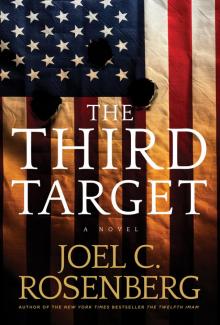 The Third Target: A J. B. Collins Novel
The Third Target: A J. B. Collins Novel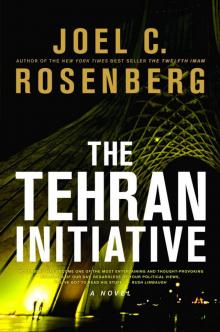 The Tehran Initiative
The Tehran Initiative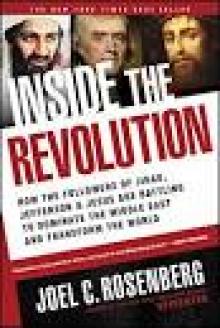 Inside the Revolution
Inside the Revolution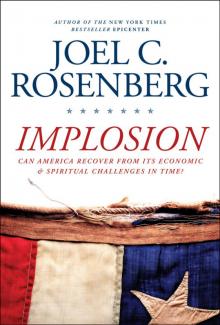 Implosion
Implosion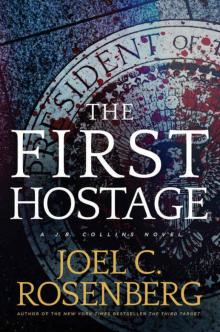 The First Hostage: A J. B. Collins Novel
The First Hostage: A J. B. Collins Novel